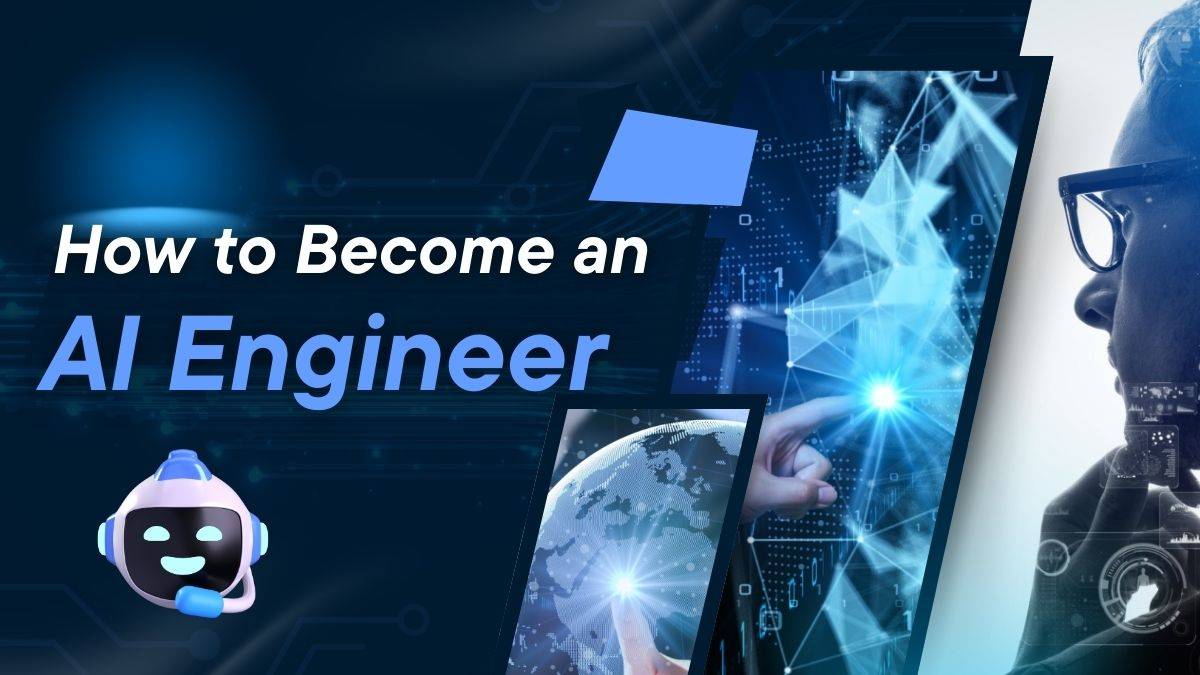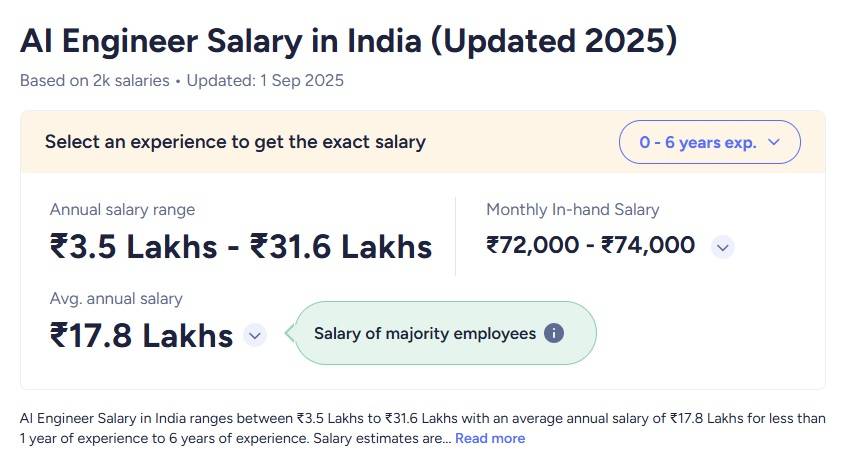How to Become an AI Engineer: Build a Career in Artificial Intelligence
Artificial intelligence is a revolutionary tech. There are self-driving cars, medical treatments, customer support, and more. AI helps in making complex problems super simple. AI skills are important for recruiters in the tech space and you can become an AI engineer which is very rewarding. Learn how to become one.
- How to Become an AI Engineer
- Best Resources to Learn Artificial Intelligence
- Artificial Intelligence Engineer Salary
How to Become an AI Engineer
One of the main learner concerns is that they don't know where to begin. Many technicalities get in the way when looking for resources to learn AI. See below.
Work Upon Fundamentals
You can start with early science and math, ie., computer science, statistics, probability, vectors, linear algebra, calculus, etc.
Then, you can learn a coding language like Python or R because both languages can implement complex algorithms using the extensive libraries in just a few lines of code.
Knowledge of the mentioned fundamentals will provide you with a more solid basis to manage your data. In addition, the basic notions include SQL and NoSQL databases, relational and non-relational databases, data visualization with Tableau or MS Excel, data formats like JSON, CSV, and XML, among others.
Improve Your Mathematics Knowledge
Mathematics and computer programming are fundamentals of AI engineering. Algebra, calculus, and statistics should be understood well. In addition to this, knowledge of programming languages like Python, R, Java, and C++ is required for model development and deployment.
Study Machine Learning and Deep Learning
Machine learning and deep learning form the basis of AI. Study machine learning algorithms and deep learning techniques, such as neural networks, to discover how machines learn and adapt through experience.
Learn Data Pre-processing
Once you understand how to handle data, similarly, it is recommended that you learn different techniques to convert unstructured data into structured data and retrieve useful information by applying Machine Learning algorithms. Some of these methods include principal component analysis, dimensionality reduction, normalization, data elimination, sampling, feature extraction, etc.
Engage in Hands-on Projects
Theory is critical, but practice does it. Engaging in practical projects gives you the experience that you require to apply your knowledge in real-world situations. Think about creating machine learning models that will be able to solve certain problems or improve current procedures.
Build a Portfolio
Having a strong portfolio is a great way to demonstrate your capability as an AI engineer. Emphasise projects you completed, noting the problems you solved and how you implemented AI solutions. Having a strong portfolio can be a job-seeker's best friend when looking for job opportunities. So how do you do it?
- Create freelance AI projects: Develop freelance projects to demonstrate your expertise. This can include anything from building a chatbot to forecasting trends in data sets..
- Contribute to open-source projects: Participate in AI open-source projects to contribute to the community and learn from other developers.
- Engage in AI competitions: AI competitions are a great place to gauge your skills and establish your worth. Data science and AI competitive platforms, such as Kaggle, DrivenData, Numerai, and CodaLab, offer a series of exciting challenges along with opportunities to solve real-world problems and acquire new skills.
Keep up to date
AI happens to be an area of constant evolution. Keep abreast of the latest research, development, and trends through conferences, workshops, application AI courses, and refresher courses. Read blogs and scientific journals, too, for the same reason: to be up-to-date with the emerging trends and best practices in the sector.
Since AI is constantly changing, you need to stay informed about the latest developments through continuing research and education.
Attend Workshops and Conferences
Participate in AI workshops and conferences to network with professionals and stay up-to-date.
Become a member of online forums and AI communities: Join online communities and forums to share ideas, raise questions, and form meaningful connections.
Best Resources to Learn Artificial Intelligence
Now that you have worked on your basics and figured that you are all set to enter the technicalities of Artificial Intelligence, you need to explore different types of resources available to help you learn the subject. Today, there are a lot of online courses and tutorials, YouTube channels, distance learning courses, bootcamps, and MOOCs (Massive Open Online Courses) from recognized universities and institutes, which follow tested and proven methodologies to help you learn the subject.
After completing basic training, you can always start a specialization in a specific domain, such as big data, robotics, deep learning, computer vision, machine learning, cognitive robotics, computational perception, and natural language processing (NLP), among others.
Online Artificial Intelligence Courses
Below are some online learning resources from the leading online learning platforms.
- Welcome to Artificial Intelligence by Udemy: The course can help you understand the basics of Artificial Intelligence and Machine Learning.
- AI for Everyone by IBM on Coursera: AI for Everyone is among the most popular AI courses online. It covers the basics of AI, including neural networks, AI ethics, problem-solving in AI, building AI strategies, etc.
- Knowledge-Based AI: Cognitive Systems by Udacity: This is a free, advanced-level AI course that covers structured knowledge representations, problem-solving methodologies, planning, decision-making, and learning methods.
- Introduction to TensorFlow for Artificial Intelligence, Machine Learning, and Deep Learning by Coursera: As the name suggests, you will get to work with TensorFlow to implement the principles of Artificial Intelligence, Machine Learning, and Deep Learning in creating scalable models WRT real-world problems.
- IBM Applied AI Professional Certificate by IBM on Coursera: The IBM Applied AI Professional Certificate will give you an understanding of AI technology, its applications, and its use cases.
- Fundamentals Of Artificial Intelligence by NPTEL: Fundamentals of Artificial Intelligence by IIT Guwahati on NPTEL gives an overview of concepts of problem-solving, knowledge representation, reasoning, and learning methods of AI.
Books on Artificial Intelligence
Books never go out of fashion when it comes to learning content thoroughly and keeping knowledge handy. These artificial intelligence books can help you further sharpen your skills.
- Artificial Intelligence: A Modern Approach: by Stuart Russell & Peter Norvig: This is a series of three books that cover the basic concepts of AI and are particularly helpful for beginners or non-programmers.
- Driven: The Race to Create the Autonomous Car by Alex Davies: The book refutes the outdated theory of big, brawny, brainy dudes reshaping the future and talks about autonomous vehicles or, popularly, robot cars.
- New Laws of Robotics: Defending Human Expertise in the Age of AI by Frank Pasquale: The book explores the world of AI, offering a glimpse into the future where factory robots, medical diagnosis algorithms, and online learning are prevalent.
- Artificial Intelligence and Soft Computing: Behavioral and Cognitive Modeling of the Human Brain by Amit Konar: This book focuses on the tools and techniques required for the intelligent realization of machines.
- Human + Machine by Paul R. Daugherty and H. James Wilson: This book explores the role of artificial intelligence in business and economic applications.
YouTube Channels to Learn AI
YouTube channels are among the most popular learning resources among tech enthusiasts. All you have to do is get subscribed to your chosen channel and learn the practical aspects of artificial intelligence or other related topics. Let’s look at some of the popular YouTube channels for AI learners.
- 3Blue1Brown: Explains the content through animation.
- Computerphile: Computerphile primarily focuses on AI techniques, covering a range of content that includes security vulnerabilities, processing power, and cybersecurity.
- Two Minute Papers: With over 1.68 million subscribers, this channel is a hit among hardcore learners. Two Minute Papers shares summaries of newly published AI research.
- Artificial Intelligence: All in One: This channel covers content related to Artificial Intelligence, Deep Learning, Machine Learning, Natural Language Processing, Computer Vision, and Data Science.

Artificial Intelligence Engineer Salary
As per AmbitionBox, the average artificial intelligence engineer salary is INR 17.8 LPA, with an average experience of 0 - 6 years.

 Call 8585951111
Call 8585951111

Rashmi Karan is a writer and editor with more than 15 years of exp., focusing on educational content. Her expertise is IT & Software domain. She also creates articles on trending tech like data science,